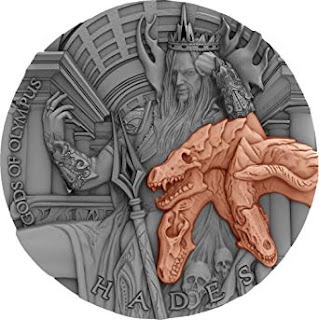HADES, lord of the dead, was a gloomy god of few words. Mortals feared him so much that they did not dare mention his name, for they might attract his attention and he might send for them. Instead of Hades they called him the Rich One, and indeed, rich he was. All the treasures in the ground belonged to him. They also called him the Hospitable One, for in his desolate underground realm he always had room for another dead soul.
Hermes guided the souls of the dead down to the brink of the river Styx, a murky, stagnant river that flowed around the underworld. There Hermes left them in charge of the ferryman Charon. If they had money to pay for their fare, Charon set them across. If not, he refused to take them, for he was greedy. Those who could not pay had to wander about till they found the pauper’s entrance to Hades. That is why when a man died, his kin put a coin under his tongue.
Sooner or later, all mortals came to Hades. Once inside his realm, they whirled about forever like dry leaves in a cold autumn wind. Cerebus, the three-headed watchdog of the underworld, stood at the gates. He let the dead souls enter, but, once past his gnashing teeth and spiked tail, they could never go out again.
Hades lived in a dark and gloomy palace with his ice-cold queen, Persephone. She was beautiful, but as silent and somber as her husband, for she wasn’t happy. She had not come to rule the joyless underworld of the her own free will. She had been kidnaped by Hades.
Hermes guided the souls of the dead down to the brink of the river Styx, a murky, stagnant river that flowed around the underworld. There Hermes left them in charge of the ferryman Charon. If they had money to pay for their fare, Charon set them across. If not, he refused to take them, for he was greedy. Those who could not pay had to wander about till they found the pauper’s entrance to Hades. That is why when a man died, his kin put a coin under his tongue.
Sooner or later, all mortals came to Hades. Once inside his realm, they whirled about forever like dry leaves in a cold autumn wind. Cerebus, the three-headed watchdog of the underworld, stood at the gates. He let the dead souls enter, but, once past his gnashing teeth and spiked tail, they could never go out again.
 |
| Hade and Persephone |

Comments
Post a Comment